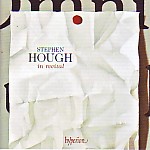Stephen Hough’s fresh and imaginative programming instincts inform a release that the pianist conceives as “two mini-recitals”. Both Mendelssohn’s Op. 54 and the Arietta of Beethoven’s Op. 111 begin quietly and unfold with increasing intensity. Op. 111’s opening Maestoso sounds faster and brusquer than usual on account of Hough’s super-literal observance of Beethoven’s note values, yet the pianist chooses cleanliness over intensity in the Allegro con brio, never quite following the composer’s dynamic extremes to their outer limits. Similar criticism applies to the Arietta, where the fastest dotted rhythms sometimes undot and lose their obsessive fervor.
Hough’s sparely pedaled, classically contained Weber Invitation to the Dance lacks the winged panache and lightness I enjoy in Michael Endres’ recent Oehms Classics release. However, Hough’s old-school inner voices and gorgeous sense of line throughout the two Chopin Waltzes unabashedly channel the great Romantic pianists without imitating them–an achievement easier said than done. The Saint-Saëns, Chabrier, and Debussy selections ooze charm and taste, but the Liszt Valse Oubliée No. 1 sounds relatively matter-of-fact next to the older Horowitz’s alluring characterization.
Heard alongside his dazzling, demonic 1987 Mephisto Waltz No. 1 for Virgin Classics, Hough’s Hyperion remake comes off positively angelic. The interpretation blurs a thin line between self-control and self-denial, with little panache and scintillation. The final selection restores Waltzing Matilda back to the waltz it never was, reharmonized à la John Ireland. An admirable disc overall, though not quite up to the memorable level of Hough’s previous mixed-composer Hyperion recitals.
































